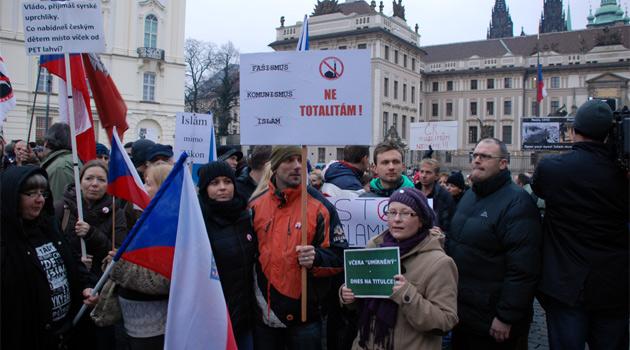Czech counter-intelligence says number of anti-Romani events fell in 2014, extremists agitating against Islam instead

Last year right-wing extremists in the Czech Republic focused on anti-Islamic themes instead of on anti-Romani invective. The radical scene there continues to be fragmented.
Left-wing extremists are in a similar situation and also do not have any leading personalities in their movement, according to the Security Information Service (BIS). The evaluation of 2014 was published today by the counter-intelligence service online in its annual report.
No larger anti-Romani events in 2014
"Generally it is possible to state that during 2014 there was not any significant venting of anti-Romani sentiment. While anti-Romani demonstrations continued, compared to 2013 their frequency and the number of their participants were significantly lower. Participation in and support for these events from local residents persisted but was less than previously. The main movers were no longer ordinary residents, but right-wing extremists or various controversial activists who wanted to exploit the topic to increase their popularity. Most demonstrations were reactions to conflicts between representatives of the majority society and ethnic Roma," the BIS writes on its website.
Anti-Romani rhetoric was exploited, according to the BIS, by those campaigning for election to the European Parliament and local councils, as well as by the political representatives of right-wing extremism. The BIS did not mention a specific party, stating that: "Their gains of several seats in municipal elections, however, were not fundamental and indicated that even in places with higher social tensions, they were incapable of winning a greater number of votes. The results of the election demonstrated that while anti-Romani rhetoric has a certain potential for voters, it apparently does not have the potential the extremists imagine it does. Most voters evidently did not trust that the extreme right would actually be capable of addressing specific problems."
BIS points out that various civic activists protested these anti-Romani events. "Despite the fact that generally their activity in the field of eliminating racial inequality can be unequivocally considered beneficial, some of their activities, or their biased and not objective statements, were made using forms that bordered on controversial. Paradoxically, as a consequence they sometimes contributed to escalating rifts between the majority and the Romani minority in localities with higher inter-ethnic tensions and exacerbated the atmosphere instead of calming the situation," the BIS writes.
"Lack of objectivity in publicly accessible information, of course, also turns up on the other side," the BIS writes. "On the Internet and on social networking sites, ethnic Roma were frequently artificially depicted as privileged people receiving certain advantages to the detriment of the majority society. Such information might then have a negative impact on the Czech public, which might receive a distorted image about Romani people living in the Czech Republic," the counter-intelligence service goes on to say.
Extreme left and right are fragmented
Neither left-wing nor right-wing extremists, according to BIS, represented a significant security risk last year. Both scenes are said to be fragmented and permanently lacking both leading personalities and a "mobilization issue".
Extremists apparently have exploited the mood of that part of the Czech public who are focused against Islam and seeking new adherents. The events they held on that issue, however, ultimately did not encounter more support from the public.
"A small part of the scene has transformed itself into entities that are doing their best not to create the impression, at first glance, that they are extremist. They distance themselves from National Socialism and they attempt to present themselves through activities against the European Union and through anti-Islamic, patriotic rhetoric. Because they defined themselves as against the ideas of National Socialism, many Czech right-wing extremists reacted very negatively to the rise of these groups," the BIS reports.
The biggest risk from left-wing extremists was that of attacks allegedly planned by the Network of Revolutionary Cells (SRB), for example, on police vehicles, which detectives are investigating as a suspected terrorist attack. SRB is the only specific entity mentioned in the entire chapter of the report dedicated to extremism.
"In 2014, several attacks were perpetrated against mink farms for which environmental extremist entities took credit," the counter-intelligence service reports. BIS also describes the interest of left-wing extremists in squatting and several attempts to occupy empty buildings in order to hold "happenings" and draw attention to dilapidated buildings.